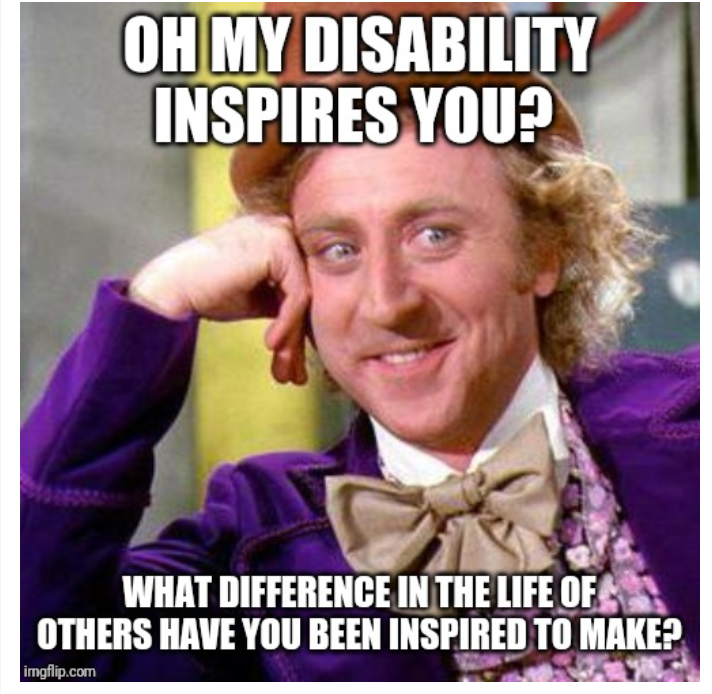
One of the most difficult concepts to get the able-bodied world to understand about disability is the “inspiration thing.” Most adults with a physical disability (myself included) feel quite insulted when people gush about how inspirational we are simply because we live with a disability.
“Inspiration” sounds like a compliment right? Please try to understand that it just isn’t. What you think is saying something congratulatory is usually pretty demeaning.
For one, we are often labeled this way when we are just living our lives like you. To assume we are heroes because we have figured out how to function in a world built for you and not us (even against us) is not only ignoring your responsibility to effect change but is succumbing to the bigotry of low expectations.
The way the inspiration talk makes me feel is similar to how many of my friends who are people of color describe feeling when they are told how “well-spoken” they are.
I’ve seen a lot of memes that talk about disability and are used to either manipulate someone (“this person has no legs, what’s your excuse?), or give the warm fuzzies (“the only disability is a bad attitude”).
Two memes I’ve seen recently shared quite a bit promote the idea that people with disabilities’ sole function is to serve as a lesson for the able-bodied world.
One says something like “Children with special needs were put on this earth to teach us to be better people.” Really? That was God’s whole goal? That’s alarming theology at best.
The other says something like “don’t ignore people with disabilities because they may inspire you.” Call me crazy, but we shouldn’t be ignored because we are people. And again, that puts the requirement on the person with a disability to make you feel better.
What’s most frustrating is, I’ve seen these sentiments from family members (usually older) of people with disabilities. Why are you perpetuating these ideas? I realize the intention is good, but the effect is harmful. Please just respect that. I and others like me will never be viewed as equal if we continue to be reduced to being a source of warm fuzzies and objectified as life lessons.
Let me close by asking you to reflect on this question: if you claim someone with a disability has inspired you, what were you inspired to do? The very word “inspire” involves the idea that someone is provoked to take action.
If someone’s presumed struggle is inspiring you, what are you doing to lessen that struggle? I’m not talking holding the door open for someone. That’s just good manners.
For example, advocating in a responsible and appropriate way for accessibility for all is something I wish more in my circles were “inspired” to do. When I bring up access issues the reaction is usually outrage with advice on how I should fix the problem.
When I share these ideas about disability, my goal is always to educate people on how their words and actions are perceived. I usually also try to offer an alternative. To be honest, right now my initial reaction is to tell you to just say nothing. Seriously, not all thoughts need to be voiced. Especially before an inward examination to realize what prejudices your comments are coming from.
The above will always be true of a stranger or someone you barely know (or your primary interaction is only social media). Just find some other way to connect. If you’re talking to a friend and you know their story, why not just say that you appreciate how they handled a specific situation? Or find some other way to compliment them that doesn’t congratulate them for living?

Hi, there!
Where I come from, “to inspire” means “to infuse with spirit”.
That could result in self-improvement, if a person is paying close attention.
You do inspire me. Other people, who have done something I have not done, also inspire me. For me, inspiring causes me to work on my own self. If someone gives an amazing talk, even if there is nothing wrong with his mouth, it inspires me to do better with my own speeches.
You inspire me to be more thankful for what I have instead of wishing my ankles were stronger. You also inspire me to get my blog site more up-to-date. And you always inspire me to pray for you and your business and your rainy day/wheelchair stuff.
Sorry if that offends, but you are just like a shaft of light from above for me. It’s a heavy cross, probably, but it’s true. <3 U. K.
I’ve waited a week to reply to this because I wanted to use wise words. I also struggled with whether I should just delete the comment or ignore it. Neither option sat well with me.
After a lengthy private conversation, we are going to have to agree to disagree on the lack of kindness involved in choosing to use language immediately after being told it is an issue. I and others like me taking issue with how that word is used against us is not indicative of a spiritual defect as you chose to imply in those conversations. And your examples of inspiration are not anywhere close to what I am talking about in the blog.
In direct response to your definition of inspiration, my response is this: As a writer, I tend to be pretty literal and use the dictionary definition of words while sometimes acknowledging cultural connotations. Either way, the first and primary definition of inspiration is “the process of being mentally stimulated to do or feel something, especially to do something creative.”
That is exactly what I said in this blog, that if someone feels the need to be “inspired” that should mean to take action on behalf of others, not just get warm feelings that stem from their own preconceived negative notions of me and people like me. I do truly appreciate that I have been able to have a positive effect on you.
“Feeling thankful for what you have instead of complaining about weak ankles.” Bluntly suggests that having a disability is a terrible fate which is COMPLETELY insulting. And “shaft of light from above” I seriously just threw up in my mouth a little reading that. Katherine, if you want to be helpful or to go with the theme ‘inspiring’ to people with disabilties, the best thing you can do is keep these thoughts to yourself.